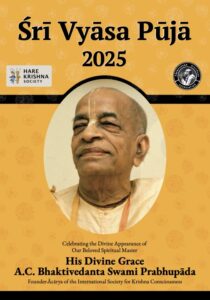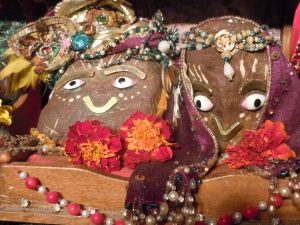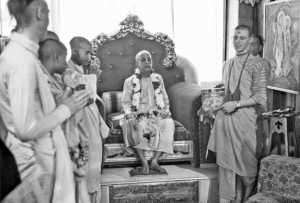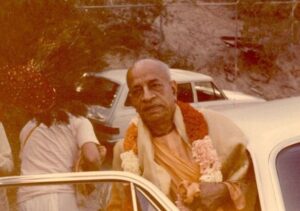June 13 1974 Paris
Prabhupāda: No, it is not imagination. That is another foolishness, to imagine a goal. If we imagine some goal, that is another rascaldom. We have to understand what is the goal of life from superior. Just like a child. He does not know what is the goal of life, but his parents know he must be educated. So goal has not to be imagined. Goal has to be understood from superior. So if the superior man is also blind, then he cannot lead other blind forward. If a blind man takes the position of superior, then he will lead these followers to the ditch only. That’s all. (French)
Pṛthu Putra: He says who can understand that someone is blind or not blind?
Yogeśvara: Who can judge.
Prabhupāda: But because he has no eyes, he cannot see. Therefore he has to hear. He has to hear. (French)
Puṣṭa-kṛṣṇa: How can one discriminate what is a real authority and who is a blind person posing as an authority?
Yogeśvara: How can we tell a real authority?
Puṣṭa-kṛṣṇa: As opposed to someone who is posing as an authority?
Prabhupāda: This authority means just like you follow somebody. You are going to somewhere by aeroplane. You do not know. But others are purchasing ticket and going there, so you have to follow them. That’s all. So the authority is if he does not know… Therefore we are giving the chance, the association of the devotee. The devotee, they are practicing something for going back to home, back to Godhead, so you have to mix with the devotees and then gradually understand.
Karandhara: No, what he’s saying is: what is the standard of measurement? There are so many people saying they are the authority. How does one individually judge which one is the best or proper?
Prabhupāda: So that he has to judge himself. It is like this: just like if you eat, then you judge yourself whether you are satisfied or not. (French) The process is described. No, no, the process is described. First of all, the thing is that he is inquisitive to know the ultimate goal. That is first qualification, that he is actually searching after the goal of life, the actual. That is first qualification. If he has no such aim, that “I must find out the actual aim of life,” then he will remain always in darkness. Then next thing, next process will be that he has to associate with person, those who are also actually the goal of life. And then next process is, as Bhagavān was telling last night, that we have no problem. Then next process will be how we have become free from all problem. Then he will say, “You do like this.” Then, acting according to him, one who says that I have no problem, “So let me act like him,” when he feels, “Yes, I have no problem,” then it is fixed up. (French)
Pṛthu Putra: He says in the Buddhist philosophy there is these three things. There is these three steps.
Prabhupāda: No, no, apart from this philosophy, we are talking general, general talk. So when he understands, “Yes, I have also no problem,” then he is fixed up. Then spiritual life begins. Yes. When he becomes problemless, no more problem, then spiritual life begins. So long he is busy to solve the problems of the material, that is no spiritual life. Find out this verse, yaṁ hi na vyathayanty ete puruṣaṁ puruṣarṣabha, sama-duḥkha-sama… Yaṁ hi na vyathayanty ete puruṣaṁ puruṣarṣabha. Y-a-m, yam.
2.15.-yaṁ hi na vyathayanty ete puruṣaṁ puruṣarṣabha sama-duḥkha-sukhaṁ dhīraṁ so ‘mṛtatvāya kalpate “Translation: O best among men (Arjuna), the person who is not disturbed by happiness and distress and is steady in both is certainly eligible for liberation.”
Prabhupāda: Yes. So long these material disturbances disturb him, he cannot get any spiritual life. Fixed up, that is the position of fixed up.
Note-Now the next question is WHO can put out this blazing fire of material existence? Who is the proper authority who has such power?
—this is a very interesting lecture below because Srila Prabhupada gives the proper method to approach God-Krsna-how this bona fide param par works. Not the way it doesnt work today in iskcon and other such places. And he also gives us who is that person who can put out this fire of maya.
——————————————————————
(Here is a quote from the iskcon deity worship website(below) that says about the param par method of worship-then compare that -to what Srila Prabhupada says below that description from iskcon..)
———————————————–
Iskcon offering Procedure for arotik
While standing on an asana and ringing a bell, present the incense first to your spiritual master by waving it in three or four graceful circles, and then present it to Srila Prabhupada and Lord Caitanya in the same manner.
Then, with the consciousness that you are offering it on behalf of your spiritual master and with the blessings of Srila Prabhupada and Lord Caitanya, offer it with the full number of circles (listed below) to the main deity.
After offering the incense to the main deity, offer it as prasada to the Lord’s associates in descending order, and to the guru-param- para—senior to junior. This may be done with seven or three circles for each personality, depending on time allowance.
Then “distribute it” (with one or three circles) to the assembled Vaishnavas as the prasada of the Lord and His associates.
Offer the remaining items in a similar way.
Offered items should not be mixed with unoffered items. You may place offered items back on the plate that was used to bring in the paraphernalia, provided no unoffered paraphernalia remains on it.
Now see (below) how the bona fide spiritual master , Srila Prabhupada describes the proper method of worship
Aug 10 1971 lecture London
We begin from our first disciplic succession. Vande ‘haṁ śrī-guroḥ śrī-yuta-pada-kamalaṁ śrī-gurūn vaiṣṇavāṁś ca. Vande ‘haṁ śrī-guroḥ śrī-yuta-pada-kamalam. “I offer my respectful obeisances unto the lotus feet of my guru, spiritual master.” Vande ‘haṁ śrī-guroḥ śrī-yuta-pada-kamalaṁ śrī-gurūn vaiṣṇavāṁś ca. And then, his guru, his guru, his guru, they’re all Vaiṣṇavas. Vande ‘haṁ śrī-guroḥ śrī-yuta-pada-kamalaṁ śrī-gurūn vaiṣṇavāṁś ca. Śrī-rūpam. Then we offer respect to Śrī Rūpa Gosvāmī. Rūpa Gosvāmī. Vande rūpa-sanātanau raghu-yugau śrī-jīva-gopālakau. All the Gosvāmīs, six Gosvāmins. Vande rūpa-sanātana… Sāgraja. Sa agraja. Agraja means elder brother. Sanātana Gosvāmī was the elder brother of Rūpa Gosvāmī, and Rūpa Gosvāmī accepted him as his spiritual master. Śrī-rūpaṁ sāgrajātaṁ saha-gaṇa-raghunāthānvitam. Associated by Raghunātha. There are two Raghunāthas: Raghunātha dāsa Gosvāmī and Raghunātha Bhaṭṭa Gosvāmī. Sa-jīvam, with Jīva Gosvāmī. This is the process. Vande ‘haṁ śrī-guroḥ śrī-yuta-pada-kamalaṁ śrī-gurūn vaiṣṇavāṁś ca śrī-rūpaṁ sāgrajātaṁ saha-gaṇa-raghunāthānvitaṁ taṁ sa-jīvam. Then we go to Caitanya Mahāprabhu’s status: sādvaitaṁ sāvadhūtam. That is also… First of all, Advaita Gosāñi, then Nityānanda Mahāprabhu, Prabhu. Mahāprabhu is applicable only to Śrī Caitanya Mahāprabhu. Others, all prabhus. Ekale īśvara kṛṣṇa āra saba bhṛtya [Cc. Ādi 5.142]. Kṛṣṇa, and He has got innumerable servants. Kṛṣṇa is Mahāprabhu, and all others, they are prabhus. And the spiritual master who has got many prabhus to abide by his order, he is addressed as Prabhupāda. This is the system. So sādvaitaṁ sāvadhūtaṁ parijana-sahitaṁ kṛṣṇa-caitanya-devam. After offering all these obeisances to Gosvāmīs, to guru, and Advaita, Nityānanda, then you come to Śrī Caitanya Mahāprabhu. Then Śrī Rādhā. Not Kṛṣṇa directly. Śrī-rādhā-kṛṣṇa-pādān saha-gaṇa-lalitā-śrī-viśākhānvitāṁś ca. Rādhā-Kṛṣṇa means they are always associated by the gopīs, of whom Lalitā-Viśākhā are the chief out of the aṣṭa-sakhīs.
So this is the paramparā system. So here also, we see, mahājano yena gataḥ sa panthāḥ [Cc. Madhya 17.186]. We have to accept the path of the authorities. Here is authority, Sūta Gosvāmī. He is offering his respect to his spiritual master, Śukadeva Gosvāmī. As soon as you offer… Just like we sung this Gurvaṣṭaka. Gurvaṣṭaka, vande guroḥ śrī-caraṇāravindam. Vande guroḥ śrī-caraṇāravindam. You can say simply “I offer my respectful obeisances to my spiritual master.” No. You must describe his activities. What is the activity of spiritual master?
saṁsāra-dāvānala-līḍha-loka-
trāṇāya kāruṇya-ghanāghanatvam
prāptasya kalyāṇa-guṇārṇavasya
vande guroḥ śrī-caraṇāravindam **
This is describing the quality. Otherwise, everyone will become spiritual master. That quality, the activity will support the bona fide spiritual master. Guṇa-karma-vibhāgaśaḥ [Bg. 4.13]. There must be quality and action. So the spiritual master’s action is that he is to deliver his disciple from the blazing fire of this material existence.
Saṁsāra-dāvānala **. The dāvānala is used because this material world is always blazing, always problem. Nobody can deny it. Simply problem. Just like fire. Fire is a problem. And especially in America we see in every city, every ten minutes or fifteen minutes there is a fire brigade: dung dung dung dung dung dung dung dung. Why? The fire is blazing always. So as we practically see that there is always fire, and the fire brigade is ready… Nobody goes to set fire. But by accident, by manipulation, fire takes place. The comparison is therefore with the forest fire. Forest fire takes place without anyone’s attempt. Simply by collision of two dry wood, there is friction, electricity is produced, and the dry leaf immediately catch hold of the electricity and it becomes fire. So this material world, everyone is trying to be peaceful, happy, tranquil. No. There must be fire. Exactly like that. The fire brigade is always ready because they know that at any moment there will be fire.
So as it is statewise, fire brigade is ready, similarly, universally, this material world is also, there is chance of fire at any moment. We do not want it, but it will take place. Therefore this material existence is called saṁsāra-dāvānala-līḍha-loka **. And the forest fire is compared, especially mentioned: this fire cannot be extinguished by your fire brigade. You cannot send fire brigade to the forest. I’ve seen in Naimitad(?). From Katgudang(?) station, about, oh, one mile up in the hill there is fire. So long ago. So I asked the man, “What is that?” “That is fire.” So nobody went there to set fire, but the fire is blazing. You see? So how this fire can be extinguished? Can you send fire brigade or buckets of water? No. That is not possible. Then it will go on, the fire? No. It will be extinguished. How? Saṁsāra-dāvānala-līḍha-loka-trāṇāya kāruṇya-ghanāghanatvam **. Just like this forest fire can be extinguished only if there is cloud upon it—if there is rain. You cannot send fire brigade. That means this is the indication that this fire of this material world can be extinguished through the exigency of spiritual master, because he has received the mercy cloud. Cloud. Just like cloud has taken water from the sea, similarly, the spiritual master takes mercy, receives mercy, from the ocean of mercy, Kṛṣṇa, and he pours it over this saṁsāra-dāvānala.
This example is very nice, that you cannot extinguish by your plans the blazing fire of this material existence. That is not possible. This is foolishness. Andhā yathāndhair upanīyamānāḥ [SB 7.5.31]. The so-called rascal leaders, they are making plan, lifelong. The United Nations making plan to stop war, fighting. They cannot do it. It is not possible. You have to take mercy from Kṛṣṇa. Then it is possible to extinguish.
Some Conclusions-In the first conversation the question was asked-who is the real and proper authority and how can we tell who this person? In the lecture in London, Srila Prabhupada explains who is such a person, and who can deliver us and put out our fire of maya? He has got some qualities which are necessary-not that anybody can become “guru”, like we have today all over the world. Hundreds, maybe thousands posing as spiritual master, guru or leader who will solve all our problems. No.
So how do we know if we have a bona fide guru? Here is Srila Prabhupadas answer.
“Yes. So long these material disturbances disturb him, he cannot get any spiritual life. Fixed up, that is the position of fixed up.”
Just viewing the history of iskcon and its constantly changing story of who is a guru and how to justify all their fall downs, and the fact that they cannot nail down with any certainty “guru tattva”, shows us they are not fixed in their siddhanta and since that is so, there also cannot be any freedom from material disturbances. On the other hand, all those devotees who strictly and sincerely follow Srila Prabhupada exclusively, their lives are becoming sublime and without disturbance !
Hare Krsna
damaghosa das
Todays darshan of Sri Sri Gaura Nitai




